As Georgia poll workers came under fire for alleged election fraud in the 2020 presidential election, the accusations stood in stark contrast to my own experiences as a poll worker in North Carolina during the same election. I had signed myself up in response to the urgent plea for poll workers amidst the pandemic, when older people were being cautioned to stay home to protect their health. My comrades that Tuesday—young and old alike—showed up to the middle school gymnasium bright-eyed and eager, despite the 5 a.m. call time. They were mostly a quiet group—kind, but not looking to make unnecessary conversation. Each person had studied hard for the role and took their job seriously. One person brought knitting for the in-between times. I brought a paperback.
That day, I was one of only a few new poll workers. Most folks had served in the position for years, if not decades, leading me to wonder what motivated them to return again and again. More recently, in advance of the 2024 election, I took the opportunity to visit a few precincts in central North Carolina and ask these volunteers about their call to duty. We discussed what compelled them to train for months in advance on the intricate and ever-changing state election laws and protocols, and to rise before dawn on Election Day to transform a gym or library or fire station into an official precinct and vigilantly monitor the day’s activities. We talked about problem-solving on behalf of voters to ensure all who showed up were able to cast a ballot and have that ballot counted. And we also discussed the mundane tasks—spraying clean the voting booth between voters, making sure the pens work, and schlepping tote bags full of signs.
Some people talked about voting rights and the long arc of history in this country that brought us to this point. Many described their own voting history and the changes they’ve witnessed. Others talked about misinformation and the news media. Everyone I spoke with mentioned integrity. They asked: As a citizen and as a poll worker, what can I do to help ensure that each person in my community has the opportunity to vote on Election Day and have that vote counted?
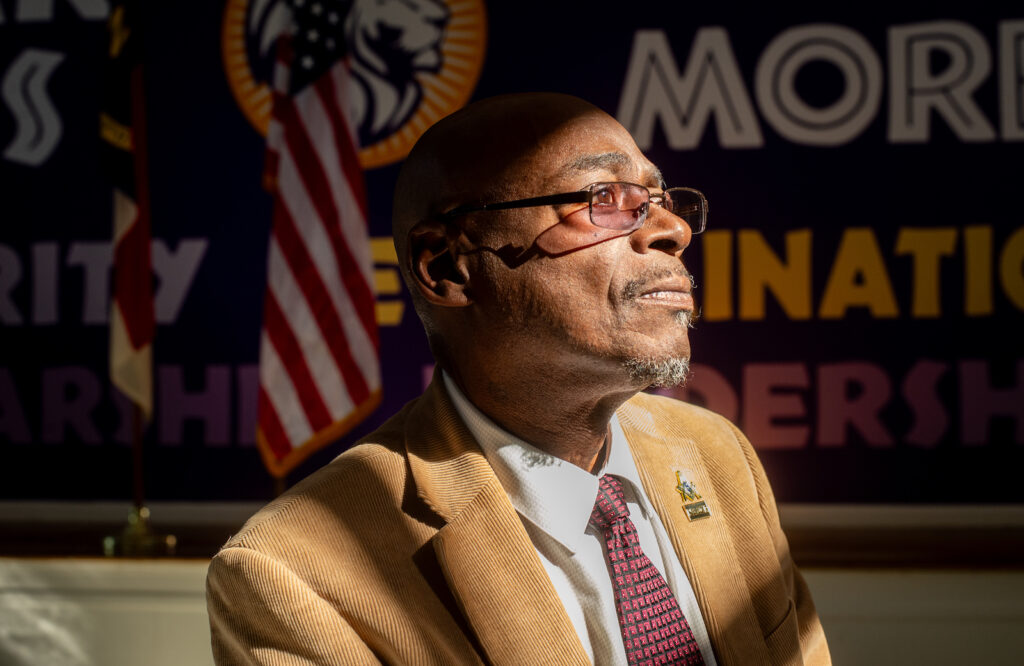
B. Angeloe Burch Sr. (59) | Durham County
I became a poll worker because I was fascinated with the fact that when I would come to vote and when I started voting, we didn’t have computers. We had these great big books, and we had to sit there and mark off people’s names. It was just a part of the election process that I loved. I wasn’t happy until I became one of those people sitting behind that table that were helping people to exercise their right to vote and making sure that the process was neat, clean, and fair.
I remember going with my mom to vote, where we had to go into this little thing and pull levers down. She pulled the curtain, and then when you pulled the curtain back it meant you’re done voting. I’ve always wanted to be a part of that process to show folks and to show my children how important it is to not only exercise your right to vote but be part of the solution. When people say, “Oh, this was rigged or that was rigged.” No, no, no. I’ve been there. I’ve seen it. And your vote matters. Your vote counts. It doesn’t count if you don’t vote.
I started out as an Assistant Judge, and then I was elevated to Judge. And now I’m a Chief Judge for the Board of Elections. It’s the greatest job I’ve ever had. I’ve seen people at the age of ninety who have voted for the first time, or someone who’s just turned eighteen and now they can vote, and the look upon their face is just indescribable. It’s just amazing. It gives you the opportunity to be a part of something that your ancestors, your forefathers, fought so hard for.
It’s just amazing. It gives you the opportunity to be a part of something that your ancestors, your forefathers, fought so hard for.
When I look at where we are today, it’s almost disgusting, because it seems like there are those that would take us back to where we were. To the point of redistricting African Americans to water down our vote so we don’t have the representation. And it’s almost as though you’re saying, “Oh, we are going to put the people that we want in your district or in your area, regardless of the party, regardless of Republican, Independent, Democrat.” Everyone should have the ability to vote for the person that they think will represent them. And it’s amazing that a country that was built upon fighting for the right to have a voice now wants to take that voice away from the citizens.
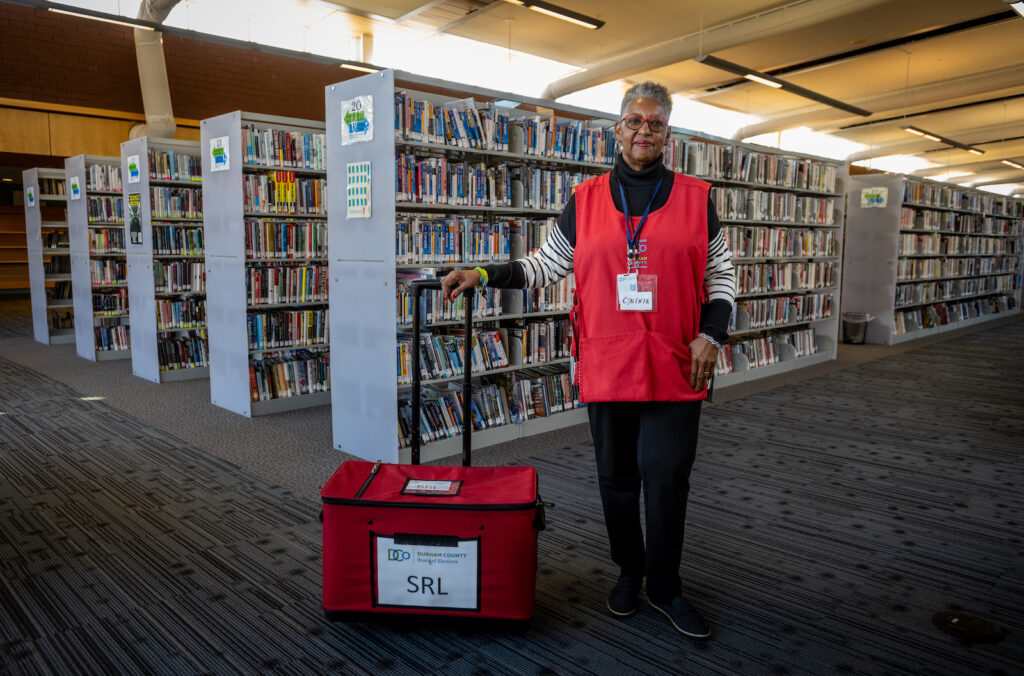
Cynthia Williams (74) | Durham County
I can’t remember the election, I just remember when I first went in to help out. I remember looking around at the staff that was working there because I was maybe twenty-four, and I thought, Oh my goodness, look at all these old people. And they worked me to death because I was young and I could run to the curb.
[Today,] I’m working early voting one-stop at South Regional Library, and my position is the site coordinator. There are several positions as a poll worker—a greeter; someone who does the check-in at registration; the ballot table, where they give that person a ballot; the tabulator, where you insert your ballot into the tabulator; curbside, because we have curbside where handicapped people can drive up; and we have the help desk. So as a site coordinator, I try to make sure that everyone is comfortable doing all those different positions.
I love it. I enjoy being around people, meeting people, and I like being busy. I like the process of voting, the balancing. And when people say that there’s a fraud or there’s problems with voting, I say to them, come and work for the Board of Elections. Try and do Early Voting and see the process of what we are doing—the checks and balances. And you will not have that perception and wonder if we are cheating if the count is not right or whatever.
It is not for everybody because everybody doesn’t want to work all day long. It’s kind of rough on your knees, your back, your feet, especially after you get to a certain age or whatnot.
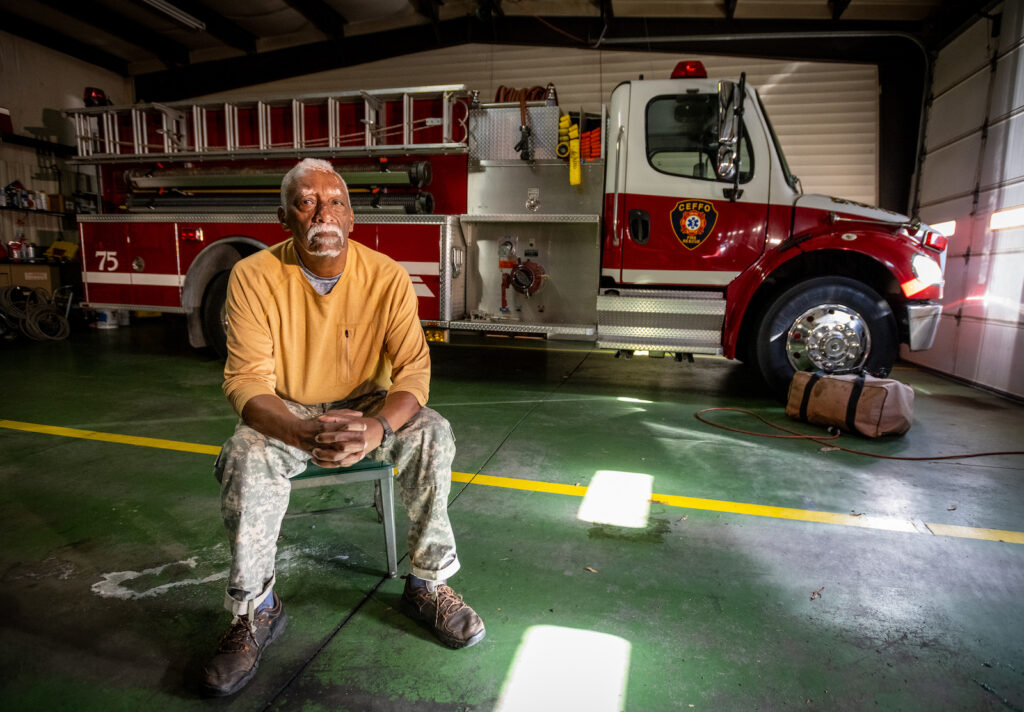
Henry Russell (71) | Person County
Being a Black person, you don’t see that many people like me being a poll worker, especially a Black male. It’s the least I can do. If you take the 13th, the 14th, and the 15th Amendments for a Black person—the 13th Amendment in 1865, it abolished slavery. Then, in 1868, the 14th Amendment, you got the right to citizenship. Then [with the 15th Amendment], Black men were given the right to vote. Ever since that time, [they’ve] been trying to take the vote away from us. So it’s been a struggle. You look back at the people who sacrificed, some of them got beat and killed just to vote with the voter registration process, and the poll tax, and all that. I mean, it’s the least I can do.
When you look at the news in terms of suppression, in some of the southern states … They’re trying to stop you from having mail-in ballots. They’re reducing the number of drop boxes. I heard [of] a county with, I don’t know, one thousand acres or more, and you only get four drop boxes for an area that big. If you get in a rural area, how can you get in your car and go? Let’s just make it easy.
I’ve seen where it’s even illegal to give someone a bottle of water while you stand in line. So it’s just amazing the stuff that goes on to suppress the vote. This is the [twenty-first] century.
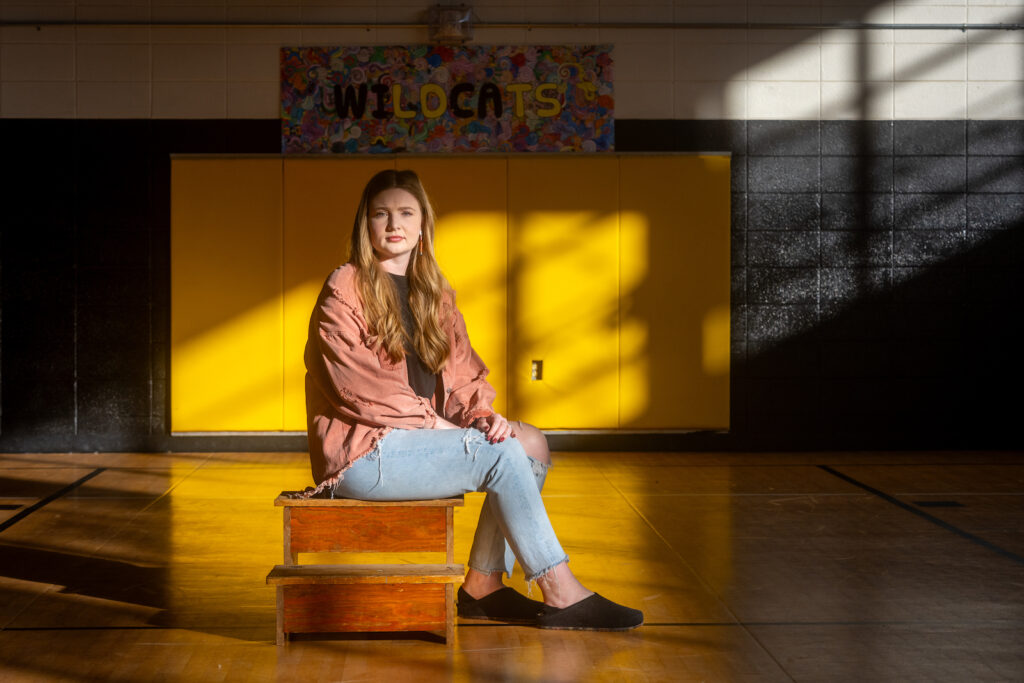
Abigail Harris (24) | Person County
I’ve lived on the same road my whole life—in three different houses, but on the same road. And we don’t get a whole lot of voters on Election Day [in Bethel Hill], mostly because it is an older community. But we always have this one lady, she’s always first. She’s a school bus driver, so she comes here on her school bus and votes and then gets on her school bus and goes and does her route.
Then we have our tobacco farmers that live right down the road from our voting precinct. They always come in early and get their votes in. Most of the time one of them [works] in soil and water, so their name’s on the ballot. It’s kind of cool to see them come in and vote. But think the coolest part about being in Bethel Hill, for me, is that I do know so many people. And while it is worldwide or statewide, I guess Election Day is more of a community day in Bethel Hill because it is so small.
I think when people come into a voting place, they expect [poll workers] to not be friendly and not smile and everything [is] serious. While it is a serious matter, you can still be friendly to people. So, for me, coming into a voting place is to see a smiling face or a familiar face. And being a poll worker is being helpful and being kind and just being willing to work in your community. And yes, while it is a long day—a really long day—it can be good. You can make friendships, you can meet people you’ve never met, and just be helpful.
To me, it’s being a light.
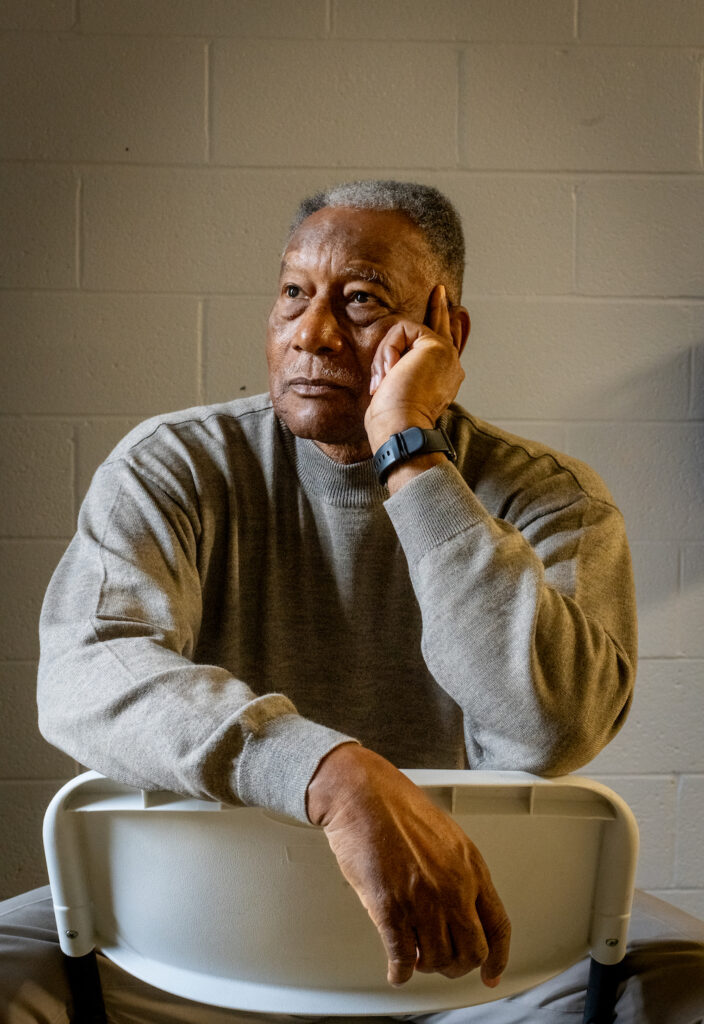
Hunter Haith (79) | Guilford County
A lot of misinformation is passed around, but when [people] come here, hopefully the information and how we treat them helps them to realize that we are above board. And after the last election and what transpired with that, hopefully we inspire confidence that what we are doing is proper and right, and they can be assured that if they are eligible to vote, that they do vote. We try and make certain that anyone who comes in, if there’s a question and they don’t show up on our roll, then we put them through with provisional ballots. Then the rest is left up to the Board of Elections, whether it goes through or not. But I don’t want anyone to leave thinking that they haven’t had the chance to vote.
For me, it is very, very important because of the history of African Americans, the difficult times, and those who came before me and others—the kinds of things that they had to go through.
For me, it is very, very important because of the history of African Americans, the difficult times, and those who came before me and others—the kinds of things that they had to go through. I’m standing on their shoulders now. And if I’m not out here trying to ensure that people who want to vote [can], for lack of a better word, I would be a hypocrite to say that I endorse voting but I’m not trying to do anything to get people to come and vote. When I turned the age of being able to vote, I went and registered to vote. And even [when I was a] Peace Corps volunteer and they sent me a ballot, I didn’t know anybody who was on there, but I did vote.
For me to do anything less, I would be a hypocrite and not living out the ideals and the struggles of those who had gone before me and others. I just couldn’t live with myself if that didn’t happen.
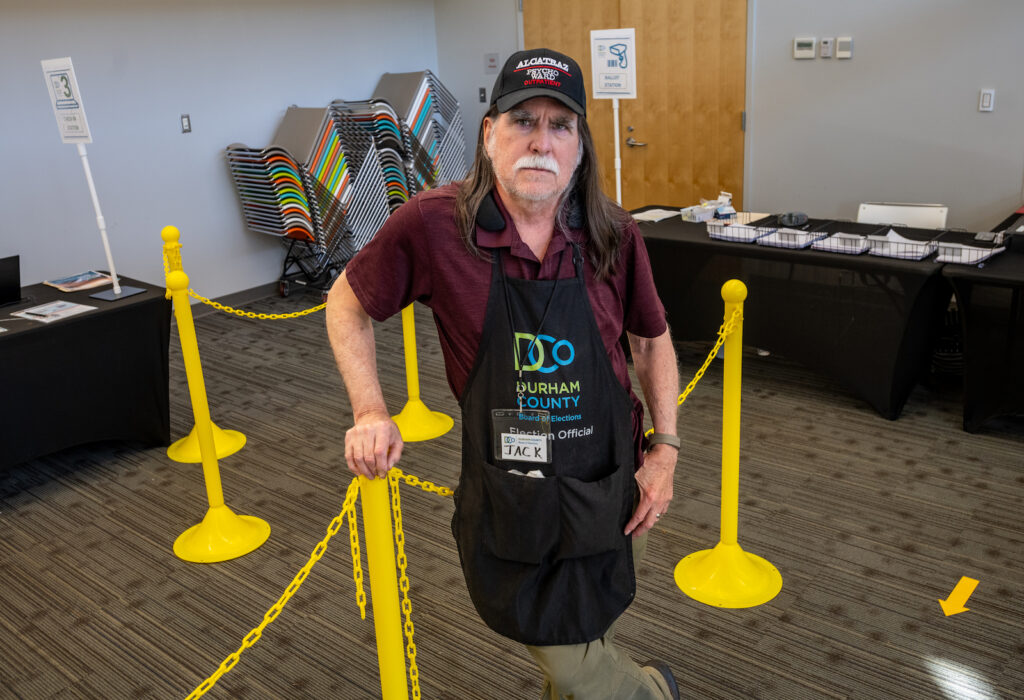
Jack Buckingham (69) | Durham County
I worked for the military for a long time, and then I worked for the government, and then you’re supposed to be apolitical. I had political opinions, but didn’t do poll working, didn’t do political work. No political involvement.
My first day of retirement was January 1, 2020 … I decided to get involved in politics because I could now and didn’t have much else to do, so I started doing polling. And then they had all the flap about illegal activities … My thoughts were, we need to reunite the country, let’s investigate [any questionable activities], put an end to it. It’s either right or it’s wrong. It either happened or it didn’t happen. Let’s not turn a blind eye and say, “Everybody’s lying.” Let’s bring peace to the country. I mean, that’s what I fought for. I wasn’t in any political positions to persuade people to do stuff, so I decided this time I would be a poll worker and observe.
From my point of view, I can’t see into the machines. I think the government could, if they made the contract correctly, but they didn’t, and so they can’t. So, I can’t validate that part. But what I can validate, the procedures here are people doing what they’re supposed to, and the procedure is reasonable to provide for security.
From this point, if you assume there’s no cheating, voting matters for people to guide the direction of the country. A lot of news medias, you see a lot of fighting between this station and that station. From my point of view, it’s really hard to know what the real truth is, so you need to vote, you need to get out and do the thing.
I think the computers need to be looked into. I think that’s legit. If for nothing else, to put the country back at peace, so that people can have confidence in it. Or if it proves to be true, then to take some corrective action.
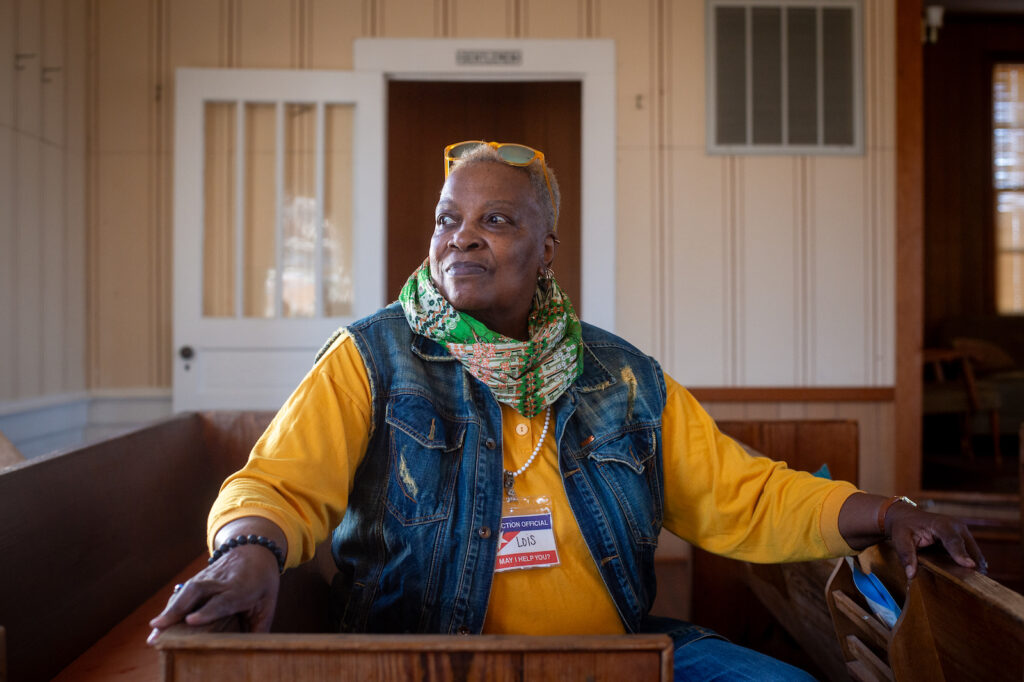
Lois Cameron (76) | Person County
I’ve been a poll worker [for] at least twenty years. I started in Durham County and then when I relocated back to Person County, I [have] been working in Person County ever since. I am the Chief Judge for Flat River Precinct in Timberlake. I do it because I can give back to the community, and I love volunteering, I love working with people and meeting people and then encouraging those that are not registered to register to vote.
I always bring my Bible. I always say to the team, let’s have prayer before we get started that today’s going to be a good day, that we are not going to face any obstacles. If we face them, we are going to challenge them with a smile. At the end of the day, when the polls close at 7:30, we get our last voter in. We say, thank you, Lord Jesus, for a job well done. We are pleased and we’re satisfied. And we always keep God first. And even when I have voters that come who try to give you a hard time, a challenge, I says, Lord, you in control. You in control. And I also say, Lord, come quick, come quick, come quick. I say that to myself. I don’t say it out loud.
I said, Lord, when an opportunity comes to vote, I’m going to cast my ballot. I’m going to vote.
When I first started voting, I was about eighteen. I grew up in the era where my parents couldn’t vote, my grandparents couldn’t vote. Then I said, Lord, when an opportunity comes to vote, I’m going to cast my ballot. I’m going to vote. Sometimes you vote for the wrong person. They don’t always do what they say they’re going to do, but still you vote. At the end of the day, you got the sticker that says, “I Voted” and your vote counts. So when I’m voting, I research to find out who I want to vote for, what they’re going to offer, and what they’re going to do. If they didn’t do anything [for] two years, then I don’t vote for them the next two years. So I do research on who I’m voting for, and I vote in every election.
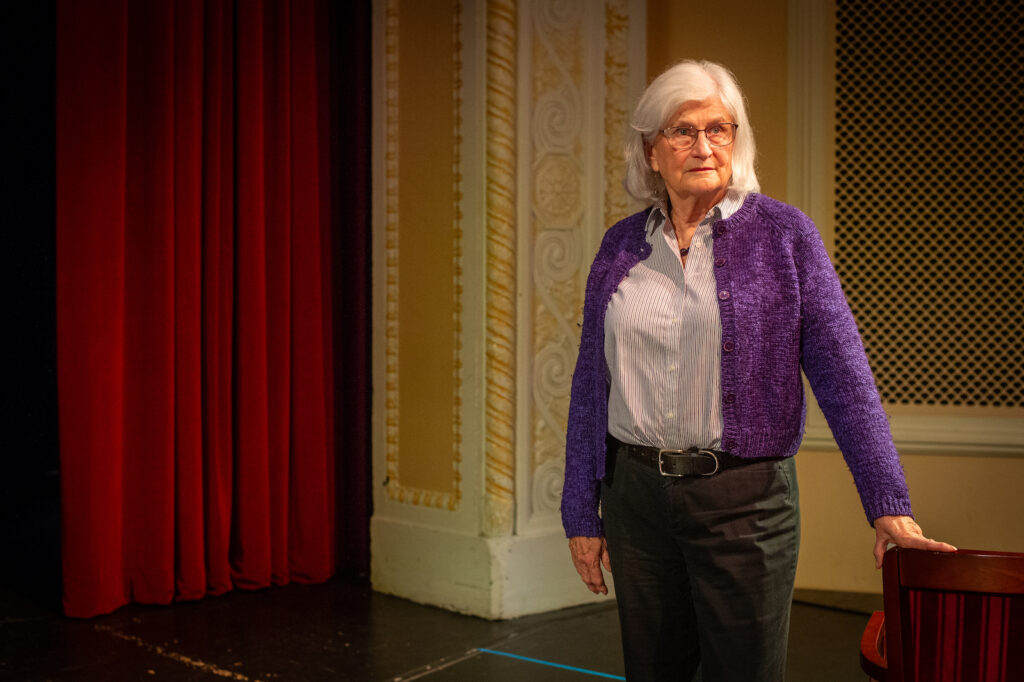
Virginia Bartlof Haskett (77) | Guilford County
I lived in this neighborhood starting at birth. This is called College Hill. It’s the hill between Greensboro College and UNC–Greensboro. I grew up here, left for more than forty years, and came back. And as soon as I got back, I volunteered with the local Democrats who steered me into a judgeship in my own precinct. And then after the State House turned Democrat, I was able to move into the Chief Judgeship. This is the place where I first voted—at the time it was called Aycock Auditorium. My dad was the [Precinct] Judge here. In fact, I think he was the Chief Judge. Precinct G44 has been a family thing.
Why I’m a poll worker probably is a mundane answer: I think it’s my terrific fear of missing out. There’s going to be something interesting happening and I won’t be there. That’s what I hate to have happen. And goodness knows, an awful lot of poll working is not very interesting, so it must be something other than that that keeps me coming back. It doesn’t need a lot of decision-making as you go along, so you can’t say “I’m upholding this principle” all the time, because mostly you’re just looking up people’s names in alphabetical order. But doing it because you want to serve well, recognizing that it is a public service, and thinking about what public [service] is.
I like to think I do it well, that I keep the faith with what a democratic electoral process should be like. And by now, I also have a loyalty to the people that work together on Election Day. I wish it were more like it was before Early Voting when everybody voted in the same twelve hours of the day on the same day, at the same place. That was a real evidence of community.
KATE MEDLEY is a Durham, North Carolina–based visual journalist documenting the American South. Her work focuses on storytelling and environmental portraiture and often explores issues of social justice and the shifting politics of the region. Medley’s debut book of photography, Thank You Please Come Again, was published by The Bitter Southerner in 2023.
Header image: Polling site on Election Day, Brogden Middle School, Durham, NC, November 3, 2020.


